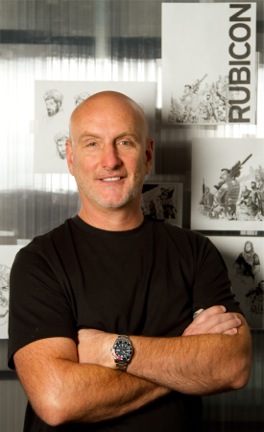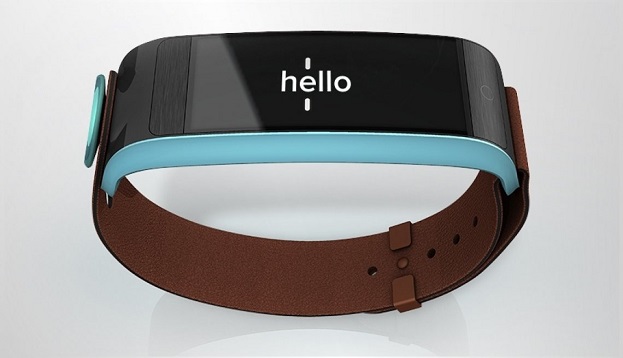Mark Long founded independent game developer Zombie Studios 21 years ago, after spending years developing early virtual reality technology. Long spent a few years heading up Meteor Entertainment, which launched the free to play Mech game, Hawken. He recently left the game development industry to work on a new wearable device, the Uno Noteband, which was designed to push communication from a smartphone or tablet to your wrist using new Spritz technology. The Indigogo campaign raised over $100,000, doubling its initial goal. The $129 wearable will launch this spring. He talks about the gaming applications for this new device, which makes its debut at CES 2015, in this exclusive interview.
 Mark Long
Mark Long
How did you get involved in this Uno Noteband project?
This started when a friend of mine invested in this Spritz technology, which is a new reading compression technology, and he asked if there was a use for gaming. I told him it’d be much better on a wearable device, so we started designing and engineering it. We’re a lot farther along than most projects. We’ll have the first factory samples available to show at the Indiegogo booth at CES.
What’s the concept behind the Uno Noteband?
It’s a simple proposition, displaying text messages that normally would be on a locked phone on your wrist. We get so many notifications pushed to us. I’ve tried virtually every wearable I can get my hands on and the Razer Nabu is closest to us. You have to have the fitness tracking built in. That’s basic today. And a watch. And we’re focusing on pushing the notifications.
What gaming applications are there for this device?
We looked into the three major networks — Xbox Live, PlayStation Network and Steam — to see how open they were. We were surprised to see all the first and third party apps you could use to log into those accounts. If you have any of those, you can log in with credentials and we’ll push those invites to your wrist. So friends inside a game can communicate to you on your wrist.
What do you feel makes this product unique?
It’ll evolve over time, but it’s unique to be in the game world, but not in the game. We allow you to stay connected with your gaming friends even when you’re nowhere near your PC or console. The second innovation is cross-platform communication across ecosystems. You can send messages via the Unoband app and then go from PlayStation to Xbox to Steam. We’re linking these ecosystems so you can communicate across gaming networks.
Where do you see your device living in the crowded wearable marketplace?
We’re in between a smartband and a smartwatch. We can’t compete with Apple and Samsung on a feature basis; they’ll always be able to do a better job than we could. Our Spritz technology reminds me of those mentats fromDune, where it shoots all that info into your brain with light. This technology is really cool and it’s easy to read all your messages.
How has crowdfunding opened up new opportunities for tech startups?
I was skeptical of crowdfunding because it was an all or nothing proposition. It has the potential to kill your ambition with the project if it doesn’t find an audience. We didn’t really need the financing to finish the project. But crowdfunding has become a little social network of people who find and support devices like this. Twenty-five percent of our backers don’t even buy the band. They just wanted to back our project. These hardware tastemakers — the smart cool guy in the office — back between 50 to 100 projects a year. They’re the nucleus of influencers that will tell other consumers about the project. This comes from the free-to-play space, where game developers rely on the community to support the game financially.
What did you learn from running Meteor Entertainment and releasing Hawken?
The free to play market is tough. It’s an industry that’s evolving very rapidly. I was surprised that Hawken didn’t find the audience we thought it would. It continues to do well on Steam. In the category of first-person shooters, it’s a hyper competitive space. Even the idea that it’s free doesn’t matter. It has to be superior in every regard. You have to deliver a better game than Call of Duty to get any interest.
What’s the latest with your old company, Zombie Studios?
We just completed a management buyout of Zombie, where the lead designers have taken over the studio after 21 years. When we first launched the company it was created for virtual reality. We called it Zombie Virtual Reality Entertainment. This was back when the first head-mounted displays were released like the one for the Atari Jaguar. But virtual reality didn’t take off. The technology was way behind the consumer promise. We were using camcorder viewfinders blown up to 180 degrees and at that time there was no DirectX or Renderware, so you had to custom code your own 3D engine. Today, Oculus has delivered everything you ever dreamed of with a ski goggle comfortable display, beautiful audio and low latency visuals. VR will finally have its day with developers making games you want to play. I’m also seeing a lot of VR movies and shorts being created, which is interesting.
What’s it like for you working back in the technology field again after so many years designing games?
It’s endlessly simulating. Hardware is a million tiny details that all have to be exactly right. It’s not like software, where that you can ship it and patch it afterward. You pay attention to things you never considered. Working in China with this project and watching this huge revolution happen there and seeing how skilled their engineers are and how hyper competitive it is; has been interesting. We’re also on the cutting edge of mobile app development. In some ways it’s like the early PC gaming years where there was Apple and the PC worlds, where there were different versions of PCs in Japan. Android is much like that.
How are you going to market the Uno Noteband?
We’re going direct to consumers. All of our ads and marketing is through social media, where you can hyper target to the consumer you want. I’ve been impressed with Facebook advertising and how targeted it is, where we can find a subset of gamers who own a fitness tracker.
What makes you think you can compete in a space where there are so many wearables?
Wearables aren’t like a mobile phone, where you have to have one and it’s tied to your subscriptions service. Wearables are like watches. People own tons of watches for different reasons and different outfits. Our aspiration is to be the Swatch of wearables: inexpensive and stylish and we just do one thing really well. It’s very clear to me after 24 hours if a wearable is something I like or not. I care about notification. Until you try this and you’re at dinner with colleagues and your phone is vibrating and you can read a text message in less than 2 seconds, you don’t see how this changes your life. You become less distracted by your phone and remain more engaged with the people around you.

